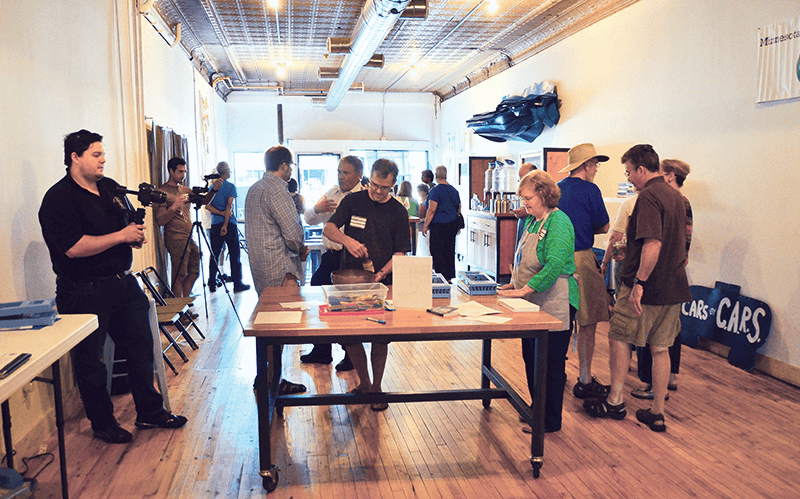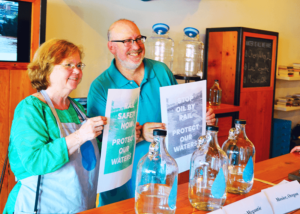“The work we have is about redistributing power, and connecting the unconnected.” With those words, Cathy Velasquez Eberhart opened a meeting of people concerned about railroad car safety, the consequences of rail accidents, and the effects on local water and its sources. Eberhart is a spokesperson for Citizens Acting for Rail Safety (CARS), a Midwest organization that works for the health, safety and quality of life of communities threatened by rail transportation.
The July 9 meeting, called “Water in the Blast Zone”, was held in conjunction with over 70 other #StopOilTrains Week of Action events across North America marking the anniversary of the July 6, 2013 oil train derailment in Lac-Mégantic, Quebec that killed 47 people. The local gathering featured speakers from CARS’ Twin Cities’ chapter who emphasized the connection between rail safety and water quality. It was held at the Water Bar, 2516 Central Ave. NE.
The term “Blast Zone” refers to the area affected by a railroad accident, usually derailment, which causes damage by collision, blast, chemical spills and/or fire. The possible damage in area is greatly affected by the number of people living nearby.
Eberhart said “Very early on, we were told that there was little or nothing the city or state could do about the hazardous things around our neighborhood – and we just didn’t believe it.”
Mark Nichols, a CARS volunteer told the group, “I became involved in the rail safety movement after a derailment happened in my mother’s neighborhood. I learned that there was little accountability by Burlington Northern Santa Fe for ‘open and obvious’ violations of regulations, and little interest from them in remediation. To this day, we have concerns about livability here.”
When CARS volunteer Claire Ruebeck bought a home near Cedar Lake, the nearby rail yard was virtually abandoned. Now, she says, ”It’s being used frequently by mile-long ethanol trains. I once thought that ethanol was part of a clean-energy solution, but I’ve read that the energy it takes to produce is not equal to the energy it provides; meanwhile, the federal government has mandated greater ethanol production, about 18 percent more than last year’s figure.” Ruebeck noted that ethanol is a commodity that can’t be shipped by pipeline, leading to “even more trainloads of this hazardous chemical passing through our cities and neighborhoods.”
Members of CARS and other groups say that some of the difficulties of getting legislation passed to further rail safety come from the political climate in the late 1800s. As the nation was growing in population and wealth, it pushed through the Western frontiers with railroads as its prime movers. To accelerate the growth of western states, the rail companies were given great latitude in their operations (exemptions from labor, immigration and anti-trust laws, eminent domain), and many of the laws written during that period still benefit the industry.
Ruebeck said, “It’s only at the federal level that the balance of power can be righted to provide the people the protection they need, and that railroad profits and productivity do not trump our future and environmental stability.”
Among the attendees were State Senator Kari Dziedzic and State Representatives Diane Loeffler and Frank Hornstein, and Minneapolis City Council Member Kevin Reich. Rep. Hornstein gave the attendees an update on current Minnesota rail safety legislation.
“We really started working on legislation in 2014, after Lac Megantic, then the big explosion and fire in Castleton, North Dakota. We got our first oil transportation safety bill. In 2014, we didn’t have CARS; what’s really great is that in 2016 we have CARS. So we had an all-star team of emergency managers, we had firefighters, and we had residents to go against a well-heeled railroad lobby.” He listed other proposals being considered, such as lowering the volatility of fuels, more rail inspections, dropping the trains’ speed limits or rerouting them around densely-populated areas.”
Hornstein added that the most critical issue for getting these initiatives passed is getting basic data from the railroads. He called them “An industry shrouded in secrecy. When we found out at a hearing in February of this year that our emergency management people, our firefighters and fire chiefs were not getting the information they need, from the railroads, to keep our communities safe, that’s when we went to work.”
An example Hornstein gave was the difficulty in getting more rail inspectors to deal with the increased traffic. By statute, the railroads are required to pay for inspectors, and they balked at MNDOT’s request for five additional inspectors to augment the single inspector then available. The railroads’ counter offer was two finally settling on three.
Other issues, Hornstein said, were the fact that railroads were not providing the emergency response plans that they are required to submit to the Pollution Control Agency (PCA), and that railroads haven’t shown sufficient evidence that they can cover the costs of large-scale spills and explosions.
Legislation that was put together with first responders and emergency managers to help address these problems did make it into a larger bill.
“I literally ran an amendment to the transportation/bonding bill to the House speaker at a quarter to midnight, on the last day of the session, and we got a unanimous vote to get it in the bill. Whether it becomes law through a special session, or it has to wait till next year, we just don’t know,” Hornstein said.
Also present was Minneapolis Fire Chief John Freutel, who talked about enhancements to the Fire Training Center in Fridley and the special training for oil spills now being held at the Camp Ripley Training Center, near Little Falls. Freutel said the expansion of training at the Camp Ripley facility will better serve rural fire departments that may face chemical and hazardous material events.
The meeting ended with a “water blessing.” Seven members of the group, each with a bottle of water taken from three communities affected by train derailments, poured some of the water into a Nepali singing bowl. When the bowl was full, a wooden mallet was rubbed around the rim, producing audible vibrations.
About the Water Bar
The Water Bar and Public Studio project began in 2014 by Colin Kloecker and Shanai Matteson. They call it a “public art pop-up,” serving local tap waters and staffed by water researchers, educators, activists, artists and other community residents. Their goal for the past two years has been to promote the importance of local water to lives and communities, and raise awareness about the larger issues of water pollution, environmental justice and climate change. In April of 2016, they set up shop in a Central Avenue storefront (the former home of Rekuski Paint and Wallpaper, for many years the Holland Neighborhood Improvement Association before they moved to a storefront space at Monroe Village).
Kloecker said that their intention is to serve water at no charge to anyone who comes by. “We want to be more like a regular business, and plan to be ready by late fall or early winter. He noted that the city requires a restaurant license “even if you’re giving it away,” and he and Matteson, his wife and business partner, are planning plumbing and other upgrades and waiting for city approvals, with anticipated costs of $10,000 to $15,000.
Asked about connections with other organizations, Kloecker said ”We’ve partnered with University of Minnesota School of Architecture, the U’s River Life program, the Humphrey School of Public Policy, and the Global Water Initiative. We’ve had a Water Bar at Anoka-Ramsey College, MWMO – Mississippi Watershed Management Organization sponsored our Northern Spark exhibit, and we’ve worked with the Institute of the Environment’s Sustainability Education program.”
Kloecker and Matteson are part of Works Progress, which was founded in 2010 by Kloecker, Matteson, Troy Gallas, and Ben Shardlow as an umbrella organization for public art projects. Unlike many non-profit artists’ collaboratives, Works Progress is an incorporated business (LLC), with its studio at Artspace Jackson Flats, and the business is now Kloecker’s and Matteson’s alone.
The Water Bar is open Monday nights from 5-10 p.m. and Saturdays from 10 a.m.-3 p.m., during scheduled public events, and by appointment, at 2516 Central Ave. NE.
First photo: “Water in the blast Zone” was held at the Water Bar on Central Avenue. Second photo: Representatives Diane Loeffler and Frank Hornstein showed their support at the meeting. The signs read “Rail safety now, Protect our water,” and “Stop oil by rail, Protect our waters.” (Photos by Mark Peterson)

